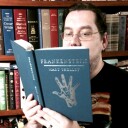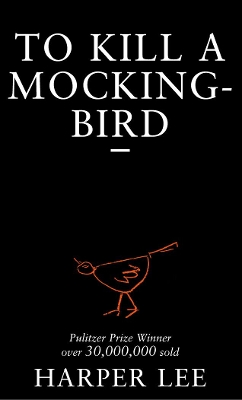
'Shoot all the Bluejays you want, if you can hit 'em, but remember it's a sin to kill a Mockingbird.'
Lawyer Atticus Finch gives this advice to his children as he defends the real mockingbird of Harper Lee's classic novel - a black man charged with the rape of a white girl. Through the young eyes of Scout and Jem Finch, Harper Lee explores with exuberant humour the irrationality of adult attitudes to race and class in the Deep South of the 1930s. The conscience of a town steeped in prejudice, violence and hypocrisy is pricked by the stamina of one man's struggle for justice. But the weight of history will only tolerate so much...
A benchmark of classic American literature, To Kill A Mockingbird approaches the highly sensitive topic of racism in 1930s America with humour, warmth and compassion, making it widely recognised as one of the best books of the twentieth century and in American literature.
- ISBN10 0099419785
- ISBN13 9780099419785
- Publish Date 5 October 1989 (first published 11 July 1960)
- Publish Status Active
- Publish Country GB
- Publisher Cornerstone
- Imprint Arrow Books Ltd
- Format Paperback (A-Format (178x111 mm))
- Pages 320
- Language English
Reviews


Amber
Full review on Books of Amber

boghunden
De første mange sider skete der ikke så meget rent handlingsmæssigt, men jeg sad som tryllebundet og læste. Sproget var helt igennem fantastisk. Nuanceret, farvet og beskrivende på en sådan måde, at tingene blev levende for øjnene af mig. Da jeg kom godt ind i bogen, begyndte den egentlige fortælling at udfolde sig for fødderne af mig. Der er lagt vægt på rigtig mange ting og det gør, at racismen ikke overskygger det hele. Der er også plads til kærlighed, fortvivlelse, naivitet, undren og rigtig meget andet. Desværre må jeg også konstatere, at bogen jo stadig er relevant i forhold til racismen.
Karaktererne i bogen er dybe og realistiske et langt stykke hen ad vejen. Der er det uvidende, men nysgerrige barn, den lidt klogere storebror, helte-far, den mærkværdige nabo osv. Karakterer vi vel alle er stødt på enten før eller siden.
Alt i alt et helt fantastisk velskrevet stykke litteratur, som alle med respekt for sig selv bør læse.

kimbacaffeinate

Michael @ Knowledge Lost
Atticus was the only truly enjoyable character for me. He was a wise and fair man, though he never wanted to take Tom Robinson case he did his upmost to make sure he was treated fairly and got the best representation possible. Atticus was the shining light throughout this book; he was a scholar and gentlemen through thick and thin. Once the court case was over and Atticus no longer had to deal with Tim Robinson the book again went back to its original slow pace and eventually fizzled out.
The book wasn’t all bad, it was well written and tackled some important topics, including racial injustice, class and even sexuality. I can see why this is a classic book and I think Harper Lee did a fantastic job at shedding light on some important social issues, the story just felt to slow for my liking, but I can understand why so many people enjoy this book.

Whitney @ First Impressions Reviews
In To Kill A Mockingbird the reader steps into the skin of six year old Scout Finch, living in Maycomb, Alabama during the 1930s. Through Scout and her brother Jem we see the world how ever unfair, through the innocent eyes of a child who slowly grows up and comes to an understanding of her surroundings.
The incident begins with their reclusive neighbor, with the children not being able to leave well enough alone and summer after summer try to get Boo to come out and play. To be honest, the really instigator on this mission with Dill, a precocious little boy who is the master of tall tales. I should also mention that Dill was based on Harper Lee's childhood friend Truman Capote.
Summer ends and School begins, with Scout having difficulty adjusting. Her idea of problem solving is using her fists rather than words, with regular telling-tos by her older (by four years) and wiser brother Jem and rational father Atticus.
Her father is also a lawyer and defends Tom Robinson, a black man accused of raping a white women. With their father being named as a disgrace ice begins to fall in the children's snow globe of a world changing their perspective on everything they thought they once knew. There's no need to reveal the verdict of Mayella Ewell's case, it was 1936 , it was open and shut from the beginning.
No matter how many times it is read To Kill A Mockingbird leaves a strong impact taking more and more away after each reread. Either wishing Atticus Finch was your father or having a better understand of the metaphor in To Kill A Mockingbird "It's a sin to kill a mockingbird. Mockingbirds don't do one thing but make music for us to enjoy." This is true on so many levels, a main example of this is the treatment of Boo Radley and Tom Robinson.
I think I will close by reminiscing of the first time I read To Kill A Mockingbird, it was labeled as required reading in ninth grade and remember my teacher saying it was her favorite book. At the tender age of fourteen most of the symbolism went over my head and didn't pick it up again until senior year of high school. Then I had an aha moment, so this is what Mrs. Fields was talking about.

Eve1972

jeannamichel
I'd say it's a must read. You shouldn't be graduating high school if you haven't read this book.
A friendly reminder: Scout is a girl- something that wasn't very clear to me until chapter three.
I love the metaphor for the title: it was absolutly brillant!
I wished it showed more of Dill and Scout's relationship. But you can't have everything.

angelarenea9

Amber (The Literary Phoenix)
What is there to say about To Kill a Mockingbird that hasn't been said before? Being a classic, it has been torn about by people whose opinions feel so much more valid than mine. It's historical importance has been touched upon time and again as Atticus' position as the lawyer of a "colored man" puts him in the position of an ethical dilemma, one in which he makes all the right decisions imaginable. In fact, Atticus himself has been revered through time as one of the greatest literary characters in history.
What caught my attention in the reading of the book, though, was not the character of Atticus - it was the character of Boo Radley. Boo was Scout's adventure, a mystery, an urban legend in his own way. Perhaps his mysterious demeanor is what makes him so attractive to the inquisitive reader. Certainly everybody has their own opinions about Boo, whereas in the case of the trial, the story in black-and-white.
I think that everyone has their own story about To Kill a Mockingbird. Even in the technology era, the story has been embedded into our society. There are too many important themes, memorable characters, and unraveled mysteries in the story for us to ever let it be forgotten.
